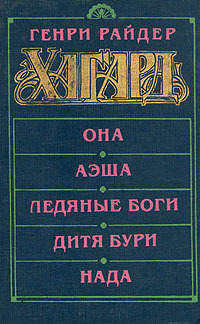
Полная версия
Belshazzar
Men ran to do her bidding, but my guard who looked doubtfully at the Syrians, remained about me, save two of them who went to my tent and thence brought my armour which they helped me to gird on.
Meanwhile that same old leech who had tended me, had been busy with Ninari whom he ordered to be carried to his tent. Now he rose and made his report to Atyra.
“The Lord Ninari henceforth must go one-eared,” he said. “Also the Egyptian’s sword has cut through his mail and sunk into the flesh of his shoulder, for the blow was mighty. Yet by chance it seemed to have missed the big vein of the neck, so unless his hurts corrupt I think that he will live.”
“I pray the gods it may be so,” answered Atyra in a cold voice, “and that henceforth his tongue may remember what has chanced to his ear. Hear me all! If any lifts a hand against Pharaoh’s envoy or his company because of this matter, he dies. Farewell, Count Ramose, till we meet again at Sais,” and with one flashing glance of her great eyes, she turned and went, followed by her women.
A while later I and my guard rode out of the camp, I mounted upon the desert-bred stallion that the queen had given me in place of my own beast which was lamed. The Syrians watched us go in silence, except one fellow who cried out,
“You won that fight, young cock of Egypt, but it will bring you no good luck who have cropped the ear of the priest Ninari and earned the curse of his god.”
I made no answer, but presently when we were clear of the camp and riding alone in the moonlight, I began to think to myself that this visit of mine had been strange and ill-omened. It began with the fall of my horse, which hurled me, as Ninari had said, like a sack of barley into the presence of her to whom I was sent, a mischance which even to this day I cannot remember without shame. Then came those hours when I lay half-swooning and in pain, and woke to find that most beautiful queen watching me alone, which in Egypt we should have thought strange, though mayhap the Syrians and the desert-dwellers had easier customs. At last she spoke and told me that she had come thus to read my soul while I slept. Why should she wish to read the soul of one who was unknown to her until that day?
Now I bethought me of what had passed between us afterwards in the ruined temple, and an answer rose in my mind. It must be because at first sight of my face this lady had been smitten with love of me, as I had heard sometimes chances to women and to men also. Could I doubt it with her kiss still burning on my lips? And yet who knew – it might be that she did but play a part to serve her secret ends, which caused her to put out her woman’s strength and make me her slave. Why not?
This love of hers, if love it were, had been most swift. Was it to be believed that she, my elder by some years, would suddenly become enamoured of a lad? Was it not easy (as indeed I knew) for a woman to feign passion? Was it not done every day on the street or elsewhere? What did a few kisses matter to such a one? Was I more than a young fool beguiled, and for this beguilement was there not good reason? I was Pharaoh’s son whom he was known to favour in his fashion because I was well-looking, quick, and, in a way, learned. Also I was his envoy, one whose report he would accept. Further, this great Syrian lady desired Pharaoh’s help. What more natural, then, than that she should strive to win that favoured son and envoy to her interests, and how could she bind him better to her than with her lips and wanton hair?
So this was the sum of it, that I knew not whether I were but a painted plaything or the jewel on her breast. All I knew, alas! was that she had taken my heart into those soft white hands of hers and that passion for her burned me up.
Truly it was an evil business and to make it worse I had quarrelled with and hewn off the ear of that jealous-hearted, foul-tongued priest-minister of hers, who doubtless hoped to wed her and thus win a throne. Oh! truly this had been an accursed journey from which no good could come, as that shouter of a Syrian had foretold. And yet – and yet, I was glad to have made it, for Atyra’s kisses burned upon my lips and I longed for more of them when she came to Sais.
We reached the palace before the dawn and I went to my chamber and slept, for after all that had chanced to me this night I was very weary. Also there was time, since none might appear before Pharaoh until within two hours of midday, after he had made his offerings to the god and rested. When at length I awoke, the first thing that my eyes fell upon was the brown, wrinkled face of my master and friend, the learned Babylonian, Belus.
“Greeting, Ramose,” he said. “I heard that you were returned and as you did not come to me, I have come to you. They are telling strange stories in the courtyards of your adventures yonder in the desert, stories that are little to your credit as an envoy, although they praise you as a man. At least I hear that your escort speak well of your swordsmanship. Now out with these tales, for they will go no further than my ears, and for the rest, perhaps I can give you good counsel.”
So because we loved each other, I told him everything from the beginning to the end. He listened, then said,
“When I entered this chamber, Ramose, I smelt two things, the scent of a woman’s hair and the reek of a man’s blood; which was natural as you have neither bathed your face nor cleaned your sword. Or perhaps the spirit that is in me did this; it does not matter. Now what has chanced to you was to be expected, seeing that you are young and well-favoured, one of a kind that women will seek out, as butterflies seek the nectar that they love in the throats of certain infrequent flowers; one, too, whose hand is shaped to a sword-hilt. So the woman has come and the sword has swung aloft and now follows the trouble.”
He paused a while in thought, then went on,
“As you know, Ramose, in the time that I have to spare from the writing of letters to Babylon and work or learning of the useful sort, I follow after divination according to our Babylonian methods by the help of stars and the shadows that these throw in crystals or in water, a foolish and uncertain art, yet one through which now and again peeps the cold eye of Truth. Last night at least it told me something, namely that you would do well to take a journey by Pharaoh’s leave, say to Memphis to see your mother, until this half-queen, Atyra, has finished her business at the court and returned to Syria.”
“I do not wish to leave the court at present, Belus,” I answered awkwardly.
“Ah! I guessed as much. They say that though past her youth, this Syrian woman is very fair and doubtless those experienced eyes of hers have pierced to your heart and set it afire. Yet I pray you to go till she has departed back to Syria.”
“You speak earnestly, Belus. Tell me, what else did the starlight show you in your crystal?”
“That which I liked little, Son – much, and yet nothing. That light turned to blood – whose blood I do not know, yet in the red mist I saw shapes moving and one of them was – yours, Ramose.”
Now I grew afraid and that I might find time to think, bade him speak on.
“Hearken, Son. You have tasted a wine that some men desire more than any other and you would drain the cup. Yet the dregs of this passionate drink from nature’s ancient cup are always bitter and often deadly or charged with shame. You would make that woman yours and perchance if she does not play with you, you may succeed, for I think that she too found the potion sweet. Yet I say that if so it will be to your sorrow and hers.”
“Why should I not love her?” I broke in. “She is beautiful and wise, she is unwed. Though she be older than I am I would make her my wife and share her fortunes. May not a man take a wife who pleases him and whom he pleases?”
“A man may if he is foolish,” answered Belus with his quiet smile, “but what is mere unwisdom for a man, for a lad is often madness. Moreover this lady lies like a bait in a snare-net full of policies, high policies that you do not understand. To meddle with her may bring about a war with Babylon, or perchance may throw the peoples whose cause she is here to plead, into the arms of Babylon and thus open Egypt’s flank to Egypt’s foes. If either of these troubles happened, do you think you would earn Pharaoh’s thanks? I say that he would curse you and cast you forth, perhaps over the edge of the world into death’s darkness.
“Indeed already one of them has begun. Because of her you have fought with a priest of her gods that are not your gods or those of Egypt, or even of the Greeks, black gods and bloody. You have cut him down and maimed him, even if he is not slain. Do you hold that this priest and counsellor will suffer those gods or their worshippers to forget such an outrage against their minister? Will he not lay that severed ear of his upon their altar and cry to them for vengeance. Already it seems the Syrians muttered curses on you as you rode away, and if they come to learn that you, an alien of another faith, are the favoured lover of their lady, the widow of their king, through whom since he has left no children, perchance one of them hopes to win his throne, what then?
“Lastly, I warn you that this business may end in terrors, or rather I pass on the warning that my spirit gives me. I pray you, Ramose, to heed my counsel. Let me go to Pharaoh and ask of him to send you hence till this embassy is finished. Indeed I would that I had gone already, as soon as I learned your tale.”
Thus he spoke and watching him I noted that he was much in earnest, for his face had flushed and his hands quivered. Now, although my flesh rebelled, for I yearned to see Atyra again more than ever I had yearned for anything, my reason bent itself before the will of this master of mine, whom I loved and who, as I knew, loved me. I would accept his decree as though it were that of an oracle; if Pharaoh permitted, I would go to Memphis or elsewhere and if I must find a sweetheart, she should be one of a humbler sort upon whose favours hung no great matters of the state. Yet, having as it seemed, made conquest of so lovely and high-placed a lady, a victory of which I was proud indeed, it was very hard to leave her without reason given or farewell. Still it should be done – presently.
“Belus,” I said, “wait a little while I bathe myself and change my garments, and eat a mouthful of food. I think that I will do as you wish, but you ask much of me and I would have a space in which to think. Be pleased, therefore, dear Belus, to grant it to me.”
He studied me with his bright and kindly eyes, then answered,
“Take what you wish, for well I know the vanity of youth and that if I deny your will, it may turn you against my counsel. I will wait, though in this matter I hold that delay is folly. Be swift now, for with every minute that passes, danger draws more near.
So I withdrew and the black slaves who were my servants, for in all ways at the palace I was treated as a great lord and even as a prince, bathed me and clothed me in fresh garments and dressed my hair. While they did so I ate a little and drank a cup of wine that was brought to me. These things done I went into the anteroom where Belus walked to and fro with bowed head.
“What word?” he asked.
“Master,” I answered, “I have taken counsel with myself and though it costs me dear, I bow to your will, knowing that you are wise, while I am but a lad and full of folly. Go to Pharaoh, lay all this matter before him, giving it your own colour. Then, if having heard, he thinks it well that I should depart, I will do so at once and see the Queen Atyra no more, though thus I earn her scorn, or even her hate.”
“Well spoken, Son!” he answered, “though I would that you had been less stubborn and had found those words an hour ago. Still, such sacrifice is hard to the young and I forgive you. Now bide you here while I wait on Pharaoh in his private chamber to which I have entry as one whom he consults upon many secret matters, also on those of his health. Presently I will return with his commands.”
As the words left his lips the curtains at the far end of the chamber opened and through them came a messenger, clad in the royal livery, who bowed to me and said,
“King’s Son and Count Ramose, Pharaoh commands your presence, now, at once.”
“I obey,” I answered but Belus at my side groaned and muttered,
“All is spoilt! Too late! Too late!”
Chapter 4
The Fall of Ramose
I was led to Pharaoh’s private chamber, Belus coming with me. Here I found him in a troubled and a wrathful mood, and guessed from his face and those of certain who waited on him, among them Amasis the General, he who was afterwards destined to become Pharaoh, that there was evil tidings in the wind. Here I should write that this Amasis, a fine-looking man though of no high birth, and a great soldier, was a friend to me to whom he had taken a fancy while I was still quite a boy. It was under his command that I had learned all I knew of matters which have to do with war, the handling of weapons and the leading of men.
“How shall we act?” Pharaoh was saying to Amasis. “There can be no doubt that the King of Babylon intends to threaten, if not to attack Egypt now that he has finished with those Hebrews. Moreover it is the matter of the Syrian tribes over whom Abibal was king that has brought the business to a head. Nebuchadnezzar, or whoever holds the real power in Babylon now that he is sunk in age, has heard of the embassy of the Queen Atyra to me, and purposes to be beforehand with us, fearing lest we should aid the Syrians. That is why he sends an army against Egypt.”
“I hold that it is but a feint, Pharaoh,” answered Amasis, “for as yet the Babylonians have not strength upon the frontier for so vast an enterprise. The best plan is to be bold. Do you send me with another army to guard our borders, and meanwhile speak this queen fair, lest suddenly she, or her Syrians, should turn round, make peace with Babylon and join in the onslaught. Then the danger would be great because those Syrian tribes are countless.”
“Good counsel, or so I think,” said Pharaoh. “Do you set about gathering troops, friend Amasis, and make all things ready, but as quietly as may be.”
At this moment his eye fell upon me, and he said,
“So you are back, son Ramose. Now tell me what is all this tale I hear about you? First it seems you tumble off your horse and make yourself a laughing-stock to the Syrians, and next you quarrel with one of them, a dangerous fellow and a priest called Ninari of whom I have heard before, and crop him of an ear. I am angry with you. What have you to say?”
“Only this, Pharaoh,” I answered. “It was my horse that tumbled over a rope, not I, and for the rest the Syrian insulted me, using words that you would not have wished your son to suffer; no, nor any gentleman of Egypt.”
“Why did he insult you, Ramose? Had you perchance drunk too much of that strong Syrian wine?”
“Not so, Pharaoh. It was because at her own request I had led the Queen Atyra to the ruined temple above her camp, that thence she might look on the river by moonlight. This I did because Pharaoh bade me to win the friendship of the queen and learn all I could of her mind.”
“Indeed, Ramose. And did you perchance learn anything else of her – let us say, that her eyes were bright or her lips soft?”
Now the blood came to my face while Amasis laughed in his rough fashion, and even Pharaoh smiled a little as he went on,
“Well, if you did, you will not tell me, so to ask is useless. Listen. I know this – for when I sent you on that business, I sent others to keep a watch on you – I say I know that this lady found you to her taste, or made pretence to do so for her own ends. Therefore I overlook your foolishness and purpose to make use of you. Presently she will be at the palace. I appoint you the officer in attendance on her with command to draw from her all you can and report what you learn to me. For now that I do not trust this woman who perchance is after all but a spy of Babylon. Do you hear me?”
“I hear, Pharaoh,” I answered bowing low to hide the doubt and trouble in my eyes.
“Then understand this also: That I put a great trust upon you, Ramose. Play the lover if you like, but remember that your first duty is to play the spy. Above all, no more quarrels with Ninari or any other. Do nothing foolish. Speak warm words, but let your heart stay cold. Now opportunity is in your hand and if you fail me, it will be for the last time; aye, your life may hang on it.”
“Spare me this task, Pharaoh,” I muttered, “for it is one that may prove too hard for me. Give it to another, an older man like – like Belus.”
Pharaoh looked at Belus who although not very old, already was bald and withered like to an ancient papyrus that for centuries has been buried in the sand. He was cold-eyed also and one who shrank away from women as though they were smitten by a plague, a man from whom wisdom and learning seemed to ooze, but whose history, heart and ends were hidden; somewhat sinister withal, save to the few he loved, perhaps from long acquaintance with dark secrets whispered by spirits in the night. Yes, Pharaoh looked at him and laughed.
“The learned Belus has his uses,” he said, “as all know when they are smitten in body or in soul, but I do not think that the cozening of fair women is one of them. Each to his trade and part. But, Ramose, beware lest you betray the one and overdo the other. Take, but give nothing, and above everything be friends with all, even with this Ninari if he lives, praying his pardon and salving his hurt with gifts.”
Then he waved his hand to dismiss me and once more fell into talk with the General Amasis.
I prostrated myself and went, followed by Belus, my tutor, who, when we had reached my quarters, sat himself down upon the floor like a mourner and wiped his brow, saying,
“Unless you are wiser than I think, son Ramose, all is finished and you are lost.”
I stared at him in question and he went on,
“Do you not understand that Pharaoh has set you a terrible task? You, the hungry bee, must hover over the open flower but not taste its nectar; you, the dazzled moth, must wheel round the flame but not scorch your wings. You, the young and ardent, must play the part of the aged and the cold. Moreover, this he has done of deep purpose, to try your quality and to learn whether duty can conquer passion. I think that if you prevail in this matter, he means to lift you high, even to the footsteps of the throne. But if you fail, why then, farewell to you.”
“I shall not fail,” I answered wearily, “for my honour is on it. Now let me rest a while. I have been hurt, I have gone through much and for two nights I have had little sleep; also I have fought for my life.”
Then without more words I threw myself down upon my bed and soon forgot all things, even Atyra.
When I awoke it was already late afternoon, so late that scarcely was there time before night fell for me to visit the chambers of the palace where the Queen Atyra and her servants were to lodge, and give orders for their preparation, as now I had authority to do. These chambers as it chanced, whether by design or by accident, adjoined my own, for I dwelt in some small rooms of that wing of the great palace that was used to house Pharaoh’s guests. Therefore I had not far to go, only the length of a short passage indeed, and through a door of which I held the key.
Until it was dark and next morning from the sunrise, aided by chamberlains and other palace servants, I laboured at this making ready. All was clean, all was garnished, everywhere flowers were set. Beautiful curtains were hung up, vessels of gold and silver fit for a queen’s use were provided; the garden ground that lay in the centre of this wing of the palace, having in it a little lake filled with lotus flowers, was tended so that if she pleased, the Queen Atyra might sit there beneath the shadow of palms and flowering trees, the eunuchs were furnished with fresh robes, and I know not what besides.
At length when all was prepared, I looked out from an upper window and saw the cavalcade of the Syrians drawing near to the palace. In its centre, preceded and followed by white-robed, turbaned men mounted upon camels, was a splendid litter which doubtless held the queen for it was surrounded by a guard of horsemen. Also there were other litters for her women, while last of all came one like that on which the sick are borne, whereof the bearers stepped very carefully, that I guessed hid none other than the priest Ninari, who to tell truth I hoped had gone to the bosom of Osiris, or of whatever god he worshipped. Belus who was by me, read as much in my eyes and shook his head, saying,
“Snakes are very hard to kill, my son, as I who have hunted one for years, know as well as any man and better than most. Be careful lest this one should live to bite you.”
Then I hurried away to be arrayed in the festal robes of a Count of Egypt and to put about my neck the gold chain that marked my rank as the son of a king. Scarcely was I prepared when a messenger summoned me to the great hall of audience. Thither I went to find Pharaoh gloriously attired, wearing the double crown, with the gold ear-rings and other ornaments of state, and holding in his hand a sceptre. Round about him were the great officers of the court, at his feet crouched scribes, while just behind the fan-bearers stood his generals, some Egyptian and some Greek, all clad in armour, amongst whom I noted Amasis.
I advanced, followed by Belus my tutor, and prostrated myself before the throne. Pharaoh bade me rise and with his sceptre pointed to where I should stand among, or rather a little in front of, the nobles and king’s sons, of whom there were several, my half-brothers born of different ladies, though I was the eldest of them. As I went, stepping backwards and bowing at each step, Pharaoh turned and spoke to Amasis and I think his words were that I was a young man of whom any king might be proud to be the father.
“Yes,” answered Amasis in a hoarse whisper that reached me, “yet it is pity that he is so like to one of those statues that the Greeks of whom you are so fond, fashion of their gods. His mother has too much share in him, Pharaoh. Look at his curly head.”
Then they both laughed and I nearly fell in my confusion.
At this moment trumpets blew, heralds cried aloud, and preceded by officers with white wands, the Queen Atyra appeared between the pillars at the end of the hall of audience. On her head she wore a glittering crown, jewels shone upon her breast, pearls were twisted in her looped and raven locks and round her white wrists, while her silken train was borne by fair waiting-women. Oh! seen thus, she was beautiful, so beautiful that as I watched her tall, imperial shape glide up that hall like a sunbeam through its shadows, my heart stood still and my lips burned with the memory of her kiss. A little sigh of wonder went up from the courtiers and through it I heard the jesting Amasis whisper once more,
“I wish that you had given me Ramose’s office, Pharaoh,” to which Apries answered,
“Nay, you are too rough, you would frighten this Syrian dove, whereas he will stroke her feathers.”
“Dove! Dove!” muttered Amasis.
Then Pharaoh lifted his sceptre and there was silence.
Atyra drew near in all her scented beauty, with bent head and downcast eyes. Yet for one instant those dark eyes were lifted and I felt rather than saw them flash a look upon me, saw also the red lips tremble as though with a little smile. I think that Belus saw also, for I heard a groan come from where he stood near by in attendance on me. The queen mounted the royal dais and curtseyed low, though prostrate herself she did not because she was a majesty greeting a majesty. Pharaoh descended from his throne and taking her hand, led her to a seat that was placed near though slightly lower than this throne.
Then she spoke – in Greek which by now had become the courtly language among many nations that did not know each other’s speech. An interpreter began to render her words, but Apries, waving him aside, answered her in the same tongue which he knew as well as he did his own, having learned it from my mother and others. This caused many of the Egyptians round him to frown, especially those that were old or wedded to ancient ways which had come down to them through thousands of years, who hated the Greeks with their new fashions, their language and all that had to do with them. Indeed I noted that even Amasis frowned and shrugged his shoulders and that the other Egyptian generals looked on him with approval as he did so.









